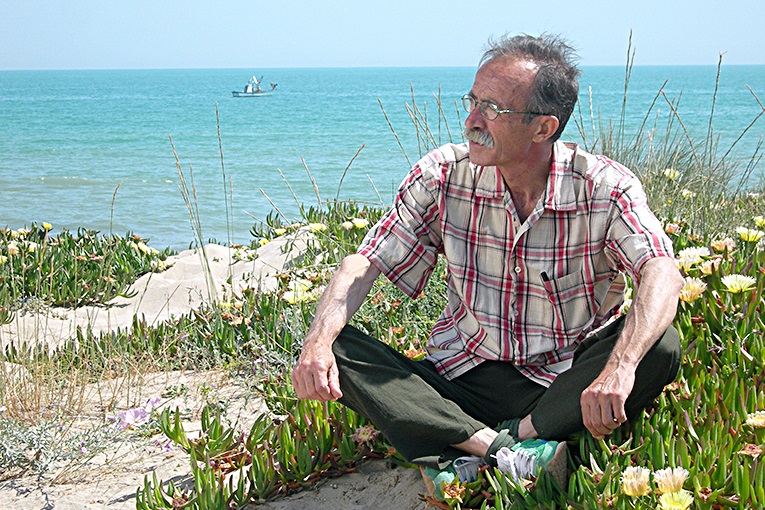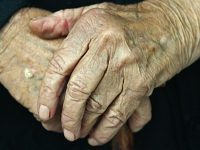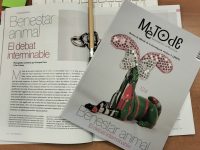

Joan Pellicer (Bellreguard, 1947-2007) graduated in Medicine from the University of Valencia, but he put his white coat away to investigate outdoors and study the bond between people, folklore and plants, without leaving linguistic richness aside. And so, he became the most representative Valencian ethnobotanist, a transdisciplinary scientific discipline pioneered by Pius Font i Quer.
Nine years have passed since the premature loss of Joan Pellicer, and the City Council of Bellreguard, his hometown, has awarded him the honorific title of Favourite Son. This act served as a reminder of the convenience of recovering his scientific legacy as well as carrying on with his work. Vallés gave two examples of the high quality and usefulness of the work done by this ethnobotanist born in La Safor.
The first one is Pellicer’s PhD thesis, supervised by Josep Lluís Fresquet, professor at the Department of History of Science of the University of Valencia. With more than 600 interviews to inhabitants of the Valencian countryside, it gave shape to his Costumari botànic trilogy (a collection of popular botany knowledge gathered by Pellicer), published between 2000 and 2004. This work is a mandatory source for the IECTB, the Spanish inventory of traditional knowledge about biodiversity, a project in progress sponsored by the Ministry of Agriculture whose first volume was published in 2015. The second one consists of all his articles and books, which were used in the online dictionary Noms de plantes. Corpus de la fitonímia catalana, published a year before, a complete glossary of the names of plants and their description in Catalan.
Besides being a precursor in the defence of the connection between the land and its inhabitants, Bellreguard’s Mayor, Joan Marco, also remarked «Pellicer’s research task, thorough and unique in Valencian ethnobotany, as well as his educational and informative work». In this sense, Jaume Pellicer, researcher at the Royal Botanic Gardens Kew in London and nephew of the Bellreguard posthumous Favourite Son, highlighted the educational values of his work, starting with Lluors de Gaia: Paisatges, flora i fauna de la Safor (1989), «a carefully-made stickers album that, when we were 11 and living adventures around crops and terraces, taught us to really appreciate nature». His work would reach its highest popularity thanks to his participation in Medi Ambient, a documentary show broadcasted in the Valencian television.
«Joan was basically self-taught in his field and, of course, he cherished his freedom over any tie. And so, far from locking himself up in a laboratory, he worked to obtain and piece together all the knowledge from the best possible encyclopaedias, the raw material itself: our farmers, our seniors», said Jaume Pellicer. «He was one of the very few capable of integrating the knowledge of the strictly medicinal properties of plants with the most common aspect of folklore, the culinary uses, without forgetting the study of the evolution of popular names, the phytonymy», he added.
the botanical cabinet
Francesc Devesa, physician and researcher at the Digestive Unit of the Francesc de Borja Hospital in Gandia, said that «college was not enough for Joan and he went looking for the old knowledge of the oral tradition». Devesa also remembered that Pellicer wanted to «find a solution for the progressive separation between popular and academic culture» in order to «gain back all the natural remedies contained in the Valencian fields». In Devesa’s opinion, one of his main goals was to «gather data in order to contribute to a better scientific knowledge of our traditional phytonymic legacy and our popular medicine. And so, the atypical doctor went away following paths and trails, roads and cattle tracks, coast and inlands, valleys, plains and mountain chains, marshes and dry lands, across all over the diànic territory».
Josep Bernabeu, professor of History of Science at the University of Alicante, highlighted how relevant some topics related to Pellicer’s work still are today, such as diets, nutrition and cooking. «The homogenisation of diets, the loss of local knowledge and flavours, the interruption of nature cycles, as well as an intensive and extremely technicised production, have resulted in a modern concept of food whose main feature is the distance between human beings and their environment», he assured. Bernabeu continued saying that Joan Pellicer «from his stance as committed intellectual, denounced this tendency and, throughout his work, defended the Mediterranean model of production and consumption as a healthy and eco-sustainable example». The ethnobotanist would always remark «the importance of the neat, diverse, balanced and healthy traditional rural Valencian cuisine, based mainly on wheat bread, olive oil, plenty of vegetables and fresh fruit, and other healthy raw food grown in a rich soil. This whole process involves an in situ diet, produced close to home», explained this professor from the University of Alicante.
Joan Pellicer’s daughters, Anna and Julia, deeply appreciated the homage to the ethnobotanist and, just as the previous interventions, they expressed their desire that this tribute would encourage a firm commitment of all the involved parties to «gather the resources and necessary means to preserve our father’s work. This just means to carry on with a millennial and endangered world view, which is useful for the present and also for future generations, if we want to preserve a world that is genetically and culturally diverse, ecological, inclusive and caring».
Maria Josep Picó. Environmental journalist, Levante.
© Mètode 2016.





